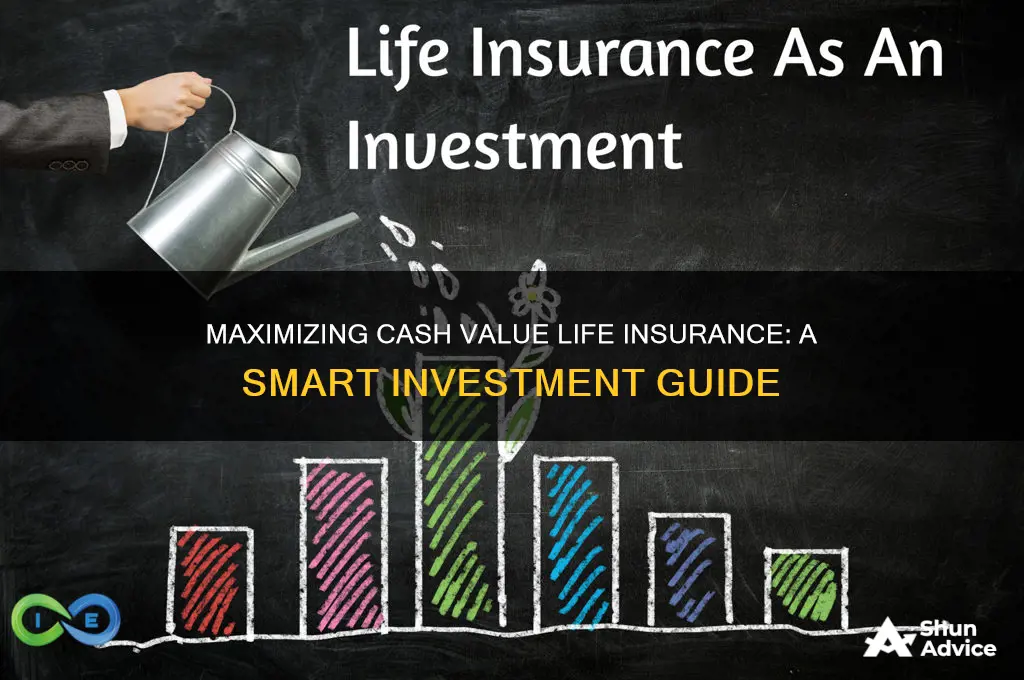
Cash value life insurance is a form of permanent life insurance that features a cash value savings component. The policyholder can use the cash value for many purposes, including borrowing or withdrawing cash from it, or using it to pay policy premiums. Permanent life insurance policies such as whole life, universal life, variable life, and indexed universal life insurance can accumulate cash value over time.
Cash value life insurance is more expensive than term life insurance as part of your payment goes towards savings. Unlike term life insurance, cash value insurance policies don't expire after a specific number of years.
| Characteristics | Values |
|---|---|
| Types | Whole life insurance, universal life insurance, variable universal life insurance, indexed universal life insurance |
| Definition | A form of permanent life insurance that features a cash value savings component |
| How it works | A portion of each premium payment is allocated to the cost of insurance and the remainder is deposited into a cash value account |
| Cash value uses | Borrowing, withdrawing, paying policy premiums, supplementing retirement income |
| Pros | Permanent coverage, savings/investment component, tax advantages, financial flexibility |
| Cons | More expensive than term life insurance, low returns, complex, risk of losing money |
What You'll Learn

Understanding the basics of cash value life insurance
Cash value life insurance is a type of permanent life insurance that includes a savings or investment component, allowing the policyholder to access the cash value in various ways during their lifetime. It is important to note that cash value life insurance is different from term life insurance, which does not have a cash value component. Here are the key basics of cash value life insurance:
Types of Cash Value Life Insurance
There are several types of cash value life insurance policies, each with its own unique features:
- Whole Life Insurance: Offers fixed premiums, guaranteed growth rates, and stable returns.
- Universal Life Insurance: Provides flexible premiums and variable growth rates depending on policy interest rates.
- Variable Life Insurance: Invests cash value in various market instruments, resulting in market-dependent returns.
- Indexed Universal Life Insurance: Links cash value growth to the performance of a market index, offering potential for higher returns.
Benefits of Cash Value Life Insurance
Cash value life insurance combines life insurance coverage with savings or investment options, providing financial flexibility. Here are some key benefits:
- Dual Benefit: It serves as both an insurance policy and a savings/investment vehicle.
- Financial Flexibility: Policyholders can access the cash value through withdrawals or loans.
- Tax Advantages: Cash value grows tax-deferred, and policy loans are typically tax-free.
- Guaranteed Growth: Whole life policies offer guaranteed growth rates, while indexed and variable policies offer market-linked returns.
- Supplement Retirement Income: The cash value can be used as a source of retirement funds.
- Stable Premiums: Whole life policies have fixed premiums, providing stability and predictability.
- Estate Planning: Cash value life insurance can provide liquidity for estate taxes and other expenses.
Managing and Utilizing Cash Value
Policyholders have several options for managing and utilizing the cash value of their life insurance:
- Withdrawing Cash Value: Withdrawals exceeding paid premiums may be taxable and will reduce the death benefit for beneficiaries.
- Borrowing Against Cash Value: Loans against cash value are generally tax-free and do not affect the death benefit if repaid. However, they accrue interest and must be managed properly.
- Using Cash Value to Pay Premiums: Once sufficient cash value is accumulated, it can be used to pay policy premiums, reducing out-of-pocket expenses.
Calculating Cash Value
The cash value of a life insurance policy is influenced by several factors, including premium payments, interest rates, policy type, duration, and fees. It is important to review policy statements or consult insurance providers for detailed information.
Considerations and Drawbacks
While cash value life insurance offers benefits, there are also considerations and potential drawbacks:
- Higher Premiums: Cash value policies typically have higher premiums compared to term life insurance due to the added savings component.
- Long-Term Commitment: Building significant cash value can take several years, and early withdrawals may incur surrender charges.
- Impact on Death Benefit: Withdrawals and unpaid loans against the cash value will reduce the death benefit paid to beneficiaries.
- Tax Implications: Withdrawals above the paid premiums may be subject to taxes, and surrendering the policy may result in taxes on accumulated gains.
CDs: Cash or Investment?
You may want to see also

The pros and cons of cash value life insurance
Cash value life insurance is a permanent life insurance policy that lasts your entire life, as long as you pay the premiums. It is an attractive option for those who want to tap into money while they are still alive.
Pros
- Your beneficiaries receive a death benefit.
- Participating life insurance policies have dividends.
- You can add riders for extra coverage.
- Cash value life insurance offers tax advantages.
Cons
- Cash value life insurance costs more than term life insurance.
- Cash value can take time to build.
- Cash value is not paid to beneficiaries in most cases.
- Your policy could lapse if you borrow too much.
- Taxes may apply if you withdraw cash value or take the surrender value and terminate the policy.
Cash Investment Strategies: Your Guide to Profitable Opportunities
You may want to see also

How to choose the right cash value life insurance policy
When choosing a cash value life insurance policy, it's important to consider your financial goals and needs. Here are some factors to keep in mind when selecting the right policy:
- Type of Policy: Cash value life insurance is typically offered within permanent life insurance policies such as whole life, universal life, variable life, and indexed life insurance. Whole life insurance offers fixed premiums, growth rates, and death benefit amounts, while universal life insurance allows more flexibility in adjusting premiums and coverage amounts. Variable life insurance provides greater investment access, and indexed life insurance ties cash value growth to stock market performance.
- Growth of Cash Value: Understand how the cash value grows in the policy you're considering. In whole life insurance, the cash value grows at a fixed rate, while in indexed universal life insurance, it is tied to the performance of a chosen index. Variable universal life insurance ties the cash value growth to the performance of chosen investments, offering higher potential returns but also carrying the risk of losses.
- Accessing the Cash Value: Consider how you may want to access the cash value in the future. Most policies allow you to borrow against the cash value, make partial withdrawals, or surrender the policy for the full cash value. Note that accessing the cash value early can reduce the death benefit for your beneficiaries.
- Costs and Premiums: Cash value life insurance policies tend to have higher premiums than term life insurance. Evaluate the costs and ensure they fit within your budget.
- Risk and Flexibility: Consider the level of risk you are comfortable with and the flexibility you desire. Whole life policies offer more predictability, while variable and indexed policies are tied to market performance and carry more risk.
- Benefits and Riders: Look into the additional benefits and riders offered by the policy. Some policies may include accelerated death benefits, chronic illness riders, or the ability to use the cash value to pay premiums.
- Tax Implications: Understand the tax implications of the policy. Cash value life insurance offers tax advantages as the cash value accumulates tax-deferred. However, withdrawing or surrendering the policy may have tax consequences.
- Time Horizon: Consider your time horizon for the policy. Cash value life insurance is typically a long-term commitment, and it may take years to build up significant cash value. If you're looking for short-term coverage, a term life insurance policy may be more suitable.
- Company Reputation: Research the insurance company's reputation and financial stability. Ensure they have a strong track record and are likely to remain solvent over the long term.
- Seek Professional Advice: Consult with a trusted life insurance agent or a fee-only life insurance advisor to get personalized recommendations and ensure the policy you choose aligns with your specific needs and goals.
A Beginner's Guide to Investing Cash in Vanguard
You may want to see also

How to access the cash in cash value life insurance
There are several ways to access the cash value of a life insurance policy. Note that the options available to you will depend on the type of policy you have and the insurance company you are with. It is important to understand the potential consequences of accessing your cash value, as it will impact the amount available to you, your death benefit, and your account's growth. Here are some common methods:
- Borrow against the cash value: You can take out a loan for anything you like. However, you will have to pay it back with interest, and if you don't, the insurer will subtract the outstanding loan amount from the death benefit.
- Make partialwithdrawals: You can withdraw money from the cash value, but if the amount you withdraw includes investment gains, this portion will be taxable as income. Withdrawals will also reduce your beneficiaries' future life insurance payouts.
- Surrender the policy for cash: If you cancel your life insurance policy, you will get back the cash value minus any surrender charges, unpaid premiums, or outstanding loan balances. However, you will lose your life insurance coverage, and your beneficiaries will not receive a death benefit.
- Use it topay premiums: Once your cash value reaches a certain level, you may be able to use it to pay your insurance premiums.
- Sell the policy: You may be able to sell your policy to someone else through a life settlement or viatical settlement. Once the sale is complete, the buyer becomes responsible for paying your insurance premiums and maintenance fees for the rest of your life and will receive the policy's death benefit when you pass away.
Invest to Conceal Cash: Strategies for Discreet Money Management
You may want to see also

How cash value life insurance compares to other policies
Cash value life insurance is a feature typically offered within permanent life insurance policies, such as whole life and universal life insurance. Term life insurance, on the other hand, does not have a cash value component.
How Cash Value Life Insurance Works
When you make a premium payment for cash value life insurance, it is split three ways: into the policy's cash value, to the insurer's cost of providing the death benefit, and toward life insurance company fees and charges. The cash value component of the policy typically earns interest or other investment gains and grows tax-deferred.
Pros of Cash Value Life Insurance
- Your beneficiaries receive a death benefit.
- Participating life insurance policies have dividends.
- You can add riders for extra coverage.
- Cash value life insurance offers tax advantages.
Cons of Cash Value Life Insurance
- Cash value life insurance costs more than term life insurance.
- Cash value can take time to build.
- Cash value is not paid to beneficiaries in most cases.
- Your policy could lapse if you borrow too much.
- Taxes may apply if you withdraw cash value or take the surrender value and terminate the policy.
If you are looking for a permanent, flexible policy that can act as an investment-like savings account, then cash value life insurance may be a good option. However, if you are looking for temporary, low-cost coverage, then a term life policy may be a better fit.
Understanding Cash Flow from Sales of Investments
You may want to see also
Frequently asked questions
Cash value life insurance is a type of permanent life insurance that features a cash value savings component. The policyholder can use the cash value for various purposes, including borrowing or withdrawing cash from it, or using it to pay policy premiums.
Most permanent policies build cash value, including whole, universal, variable, and indexed universal life insurance. Term life insurance does not have a cash value component.
Cash value life insurance combines a death benefit with a savings or investment component, providing both protection and a financial asset. The cash value accumulates over time and can be utilized in various ways, such as withdrawals, loans, or surrendering the policy.
Cash value life insurance offers the benefit of accessing cash during the policyholder's lifetime and provides lifelong coverage. However, it tends to have higher premiums than term life insurance, requires active management, and has relatively low net interest rates on cash value loans.
The choice depends on your risk appetite and desired flexibility. Whole life policies offer fixed premiums, death benefits, and guaranteed returns. Universal life insurance allows adjustments to premiums and coverage but offers varying levels of risk for cash value growth.







